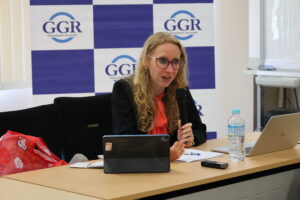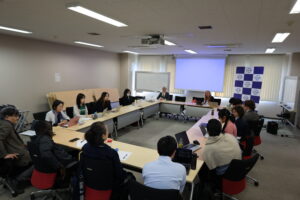On April 30, 2025, Hitotsubashi University’s Institute for Global Governance Research (GGR) hosted its 38th Brown Bag Lunch Seminar titled “The EU and Gender Equality: The Istanbul Convention and Its Impact on the EU” featuring Dr. Sara De Vido, Professor of International Law at Ca’ Foscari University, Italy.
Dr. De Vido opened her talk by underscoring that gender equality is a fundamental value of the European Union (EU), enshrined in its legal and policy frameworks. Key EU treaties Article 2 TEU, 3 TEU, and 8 TFEU mandate the promotion of gender equality and align with the Istanbul Convention’s emphasis on structural equality. The EU Charter of Fundamental Rights also guarantees equality between women and men. The speaker traced the evolution of EU secondary legislation, noting early focus on equal pay and treatment in employment, with significant consolidation in the 2006 Recast Directive.
However, violence against women (VAW) remained insufficiently addressed. While the Victims’ Rights Directive (2012/29/EU) acknowledged gender-based violence, it wasn’t until the recent Directive on combating violence against women and domestic violence that VAW was clearly defined as a fundamental rights violation and form of structural discrimination, aligning EU law more closely with the Istanbul Convention. Adopted in 2011, the Istanbul Convention remains the most comprehensive international treaty addressing VAW and domestic violence. It defines VAW broadly to cover physical, sexual, psychological, and economic harm and emphasizes four pillars: prevention, protection, prosecution, and integrated policies. It also calls for intersectional approaches, particularly regarding the vulnerabilities of migrant women. The EU’s accession to the Convention enhances coherence across its legal framework.
During the Q&A, discussion turned to the European Artificial Intelligence Act (EIAC) and gender implications. Dr. De Vido criticized the Act’s “neutral” approach, which she argued overlooks gendered harms such as deepfakes and non-consensual image sharing. She pointed out a lack of coordination between the EIAC and the new VAW directive, warning that this fragmentation weakens protections. Citing Article 6 of the Istanbul Convention, she stressed that all EU policies, and not just those on gender-based violence, must be gender-sensitive.
In closing, Dr. De Vido emphasized that the Istanbul Convention has significantly expanded the EU’s gender equality agenda beyond employment, reinforcing commitments to safety, justice, and dignity. Its integration into EU law reflects a deeper dedication to inclusive protections, and positions the EU as a global leader in gender equality.
[Event report prepared by] Billal Hossain(Doctoral student, Graduate School of Law, Hitotsubashi University)
 |
 |
